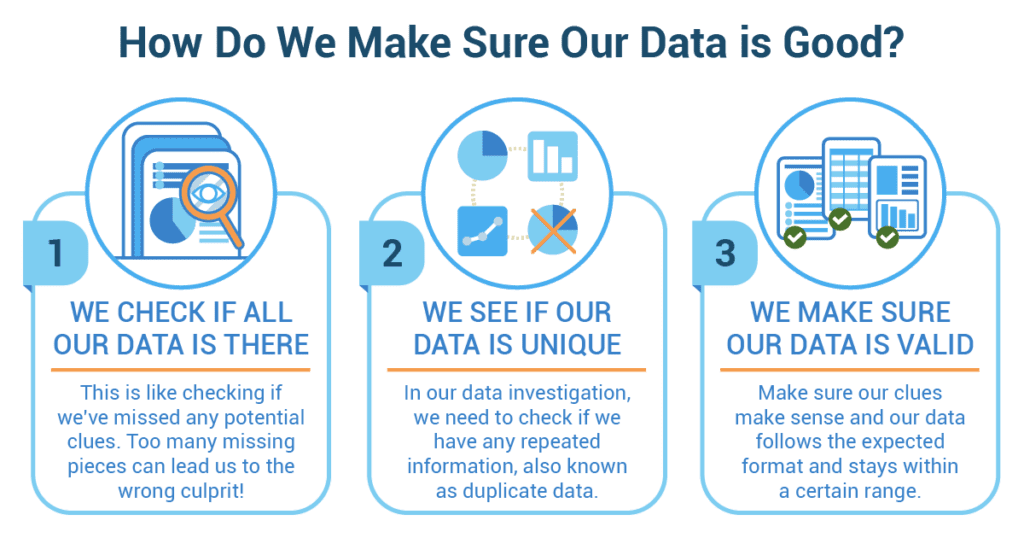Imagine you’re cooking a grand feast for a special occasion. You’ve handpicked a recipe, shopped for the finest ingredients, and set aside ample time to prepare. Now, would you knowingly pick bruised apples for your apple pie or use expired milk for your creamy mashed potatoes? Of course not! The quality of the ingredients you use directly impacts the taste and overall success of your meal.
Why is poor-quality data dangerous in our investigation?
Ensuring good quality data
Just like in our detective story, we need to double-check our clues to make sure they’re reliable.
- We Check if All Our Data is There
This is like checking if we’ve missed any potential clues, like forgetting to ask someone in the house about the pizza. If some data is missing, we need to know how much is missing. Too many missing pieces can lead us to the wrong culprit! - We See if Our Data is Unique
Imagine if we counted the same crumb twice, making it seem like a bigger mess was left behind than there really was. In our data investigation, we need to check if we have any repeated information, also known as duplicate data. - We Make Sure Our Data is Valid
This means making sure our clues make sense. If we found fish scales at the scene, but no one in the house had been near a fish, that clue (or data) would not be valid. In the same way, we have to make sure our data follows the expected format and stays within a certain range.
Remember, being a data detective is a lot like solving a mystery. You need good, reliable clues to find the right answer. So, always make sure your data is complete, unique, and valid before jumping to any conclusions!
Unveiling the Significance of Data Quality Assessment in Exploratory Data Analysis for Blog Writing
In the vibrant landscape of content creation, Sarah Johnson, a seasoned corporate professional and passionate blogger, found herself at the crossroads of innovation and data-driven insights. Her journey embarked upon understanding the crucial role of assessing data quality in exploratory data analysis for blog writing, seamlessly integrating her corporate acumen with her creative pursuits.
Sarah’s project delved into the world of blog writing, aiming to uncover the patterns and trends that resonate with online readers. Recognizing the pivotal role data played in shaping content strategies, she embarked on a journey to unveil why assessing data quality was vital in her exploratory data analysis endeavors. Sarah was no stranger to the demands of both the corporate and creative worlds. She knew that successful content creation wasn’t just about artistic expression; it was about reaching and engaging a target audience effectively. In her experience as a blogger, she had learned that a plethora of data, ranging from engagement metrics to user behavior, was at her disposal. However, she realized that the worth of this data hinged on its quality.
Sarah understood that data quality was the bedrock upon which meaningful insights were built. As a corporate professional, she was aware of how poor data quality could lead to misguided decisions, and as a blogger, she knew that uninformed content decisions could lead to disengagement and irrelevance. This dual perspective emphasized the necessity of assessing data quality to ensure the accuracy and reliability of her analysis.
Drawing parallels from her corporate experience, Sarah recognized that poor data quality could lead to misinterpretations. Just as misread data could lead to skewed corporate strategies, it could also result in crafting content that missed the mark with readers. Sarah’s case study underscores how data quality assessment acts as a safeguard against misconceptions, promoting data-driven content that resonates with her audience. Sarah’s dual role as a corporate professional and blogger highlighted the synergy between data insights and creativity. She understood that data quality assessment paved the way for targeted insights that informed her creative decisions. Just as strategic corporate moves were guided by reliable data, her content creation process was fueled by quality data that inspired her artistic expression.
Sarah’s project was not just about content; it was about optimizing resources. Just as corporations aimed to maximize ROI, Sarah aimed to maximize the impact of her content. She knew that the time and effort invested in data analysis and content creation would yield better returns if based on accurate and high-quality data. Through her journey, Sarah discovered that assessing data quality was not merely a checkbox in her exploratory data analysis process; it was a strategic imperative. Her case study exemplifies how a corporate professional’s attention to precision can seamlessly merge with the artistry of content creation. Through her dual lens, Sarah underscores the significance of data quality assessment in shaping insights and content that are both insightful and engaging in the world of blog writing.
